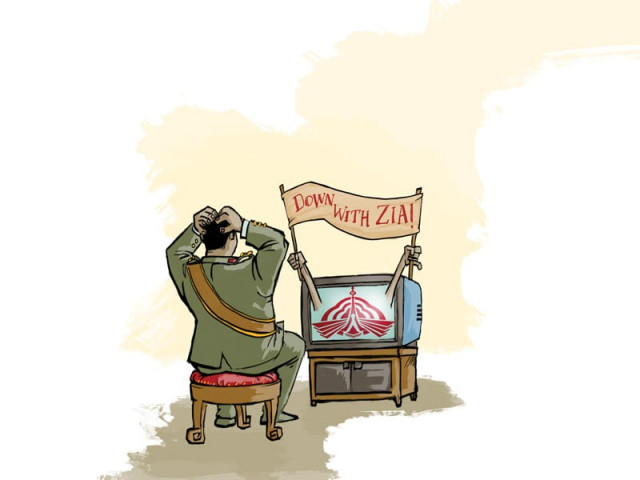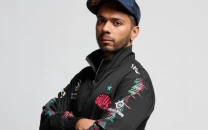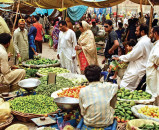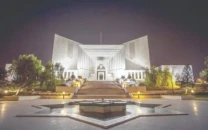Blacked out
On June 13, 1982 four young self-exiled Pakistani men were going to make sure the day was remembered.

Blacked out
June 13, 1982 wasn’t an ordinary day to begin with, and four young self-exiled Pakistani men were going to make sure it was remembered as an extraordinary one.
This was a time when hockey ruled hearts in the country and reigning world champions Pakistan were taking on the Netherlands in the Dutch city of Amstelveen.
Pakistanis were glued to their TV sets, watching the action unfold live on their screens. But in the stadium itself, along with throngs of frenzied fans, were a small group of Pakistanis who weren’t there to watch the Greenshirts take on the Dutch. They were there to send a message to their brethren back home.
“Accelerate the struggle in Pakistan against the Ziaul Haq dictatorship!” This was the slogan that suddenly flashed across the television screens of millions of viewers watching Pakistan Television (PTV) on the evening of June 13, 1982.
Just after halftime, the activists unfurled a 10x2 metre banner inscribed with this message and began to chant slogans against Zia and his repressive regime. The Dutch police and media, and more importantly, the media manipulators of PTV were caught off guard as the protesters, quite literally, brought their message home.
In a panic, the PTV broadcasters pulled the plug, and for the rest of the match only the commentary could be heard as the screens remained blank. But it was too late. The message had been delivered and their comrades back home knew that they were not alone.
The seeds of this unique protest had been planted two years earlier, when a number of leftist Pakistani activists who had fled Pakistan to escape Zia’s repression found themselves in Amsterdam in the cold November of 1980. Brainstorming ideas and strategies to oppose Zia while in exile, they came up with the concept for a progressive organisation they dubbed the Struggle Group which would keep the flame of protest alive, even in exile.
It was to this group, which now numbered over 70, that the four daring protesters belonged. They were Farooq Tariq, Tanvir Gondal (now better known as Laal Khan), Muhammed Amjad and Ayub Gorya. While they, along with the Struggle Group itself, now worked loosely under the umbrella of the PPP, the roads that led them to the Amstelveen stadium were varied.
Farooq Tariq, now a member of the Labour Party Pakistan, had recently graduated from Punjab University in the late 1970s and was known for his propensity for getting involved in anti-status quo movements. After graduation he started working for a left-wing weekly newspaper called Al-Fatah as its Punjab correspondent covering the Mazdoor Tehreek and the workers movement. It was during this period that Zia deposed former prime minister Zulfikar Ali Bhutto and declared martial law.
“When I landed a scoop showing that senior leaders of PPP were meeting Zia, my homes in Toba Tek Singh and Faisalabad were raided and so was my uncle’s office. It was just sheer luck that the authorities couldn’t find me,” says Tariq. “I was in hiding in Lahore and I knew that the police was after me on behalf of the military authorities. This is when I knew that I had to leave the country.”
Now in self-exile in Holland, Tariq decided to dedicate his pen to the cause. “In November 1980, we decided to start a monthly magazine called Jidd-o-jehed or The Struggle,” Tariq says.
This monthly magazine was one of the few that was dedicated to covering the situation within Pakistan. “Coverage on Pakistan was very limited. There was no email or social networks, and telephones were expensive. Jang newspaper was available only in England and came to Holland a day after, so news was limited,” adds Tariq.
The magazine would also be instrumental in publishing revolutionary poets who had found themselves in exile, such as Faiz Ahmed Faiz and Habib Jalib, and also helped unearth the hitherto hidden talents of Khalid Javaid Jan.
“There were many people who died in Pakistan that have now been forgotten,” recalls Jan, who even now bears the scars of when his legs were broken by a police baton during a student protest at Rawalpindi Medical College on April 4, 1980.
In the late 1970s, Jan had been the leader of a liberal-democratic student group, The Eagles. Their slogan was simple: “Down with the left and right, Eagles student might!” Later, however, he found himself allied more closely with the Left.
As tensions rose on campuses in Punjab after Bhutto was hanged, Jan and Gondal would lead increasingly vigorous protests at their college, where General Zia’s own son and daughter were studying. Gondal had earlier been transferred from Multan’s Nishtar Medical College to prevent him from mobilising students.
After Jan’s legs were broken by the police, Gondal and his friends would visit him in hospital. There, Jan handed over to them a poem he had written as a teenager, the well-known Main Baaghi Hoon.
The poem was published in The Struggle in December 1984. The next month, on January 5, 1985, the poem was read out loud by Benazir Bhutto at a poetry recitation in Convoy Hall, London, in the presence of eminent poet Ahmed Faraz.
“I was practicing as a doctor and when I heard that Benazir had read my nazm, I really could not believe it,” exclaims Jan. “I think the poem connected with the sentiments of what the people were feeling at that time, and these activities were used as a weapon against Zia.”
In a time where publications expressing dissent were few and far between, Faiz and Faraz would also contribute to The Struggle magazine, which developed a cult status among the Pakistani diaspora. The magazine would be important on other levels as well: smuggled into Pakistan, it also provided much needed moral support to pro-democracy activists, whose access to printing presses had been curtailed.
“I would read publications of The Struggle group. I was particularly captivated by their pamphlet on partition. The publication became the reason why I joined them in the ‘90s,” says Farooq Sulehria, a left-wing activist and columnist from Sargodha.
Sulehria was also one of the millions who saw the group’s protest live on PTV and vividly recalls being inspired by their activism, courage and ingenuity.
“For a few seconds, before PTV could react, viewers could see the protest at a time when even the name of Zulfikar Ali Bhutto was banned on PTV. I saw it. Many of us were enthused and inspired. But at the time I did not know that it was The Struggle activists who were behind it.”
Meanwhile, Tariq and his comrades continued with their activism in exile. They would go on to organise a mass funeral for Bhutto in front of the Pakistani embassy in Holland with nearly 500 participants. The charged environment also saw participants throw stones at the embassy’s windows and Farooq was briefly arrested by Dutch police.
“Our friends threw the stones but I got arrested. It became a bit of a militant funeral in memory of Bhutto,” recalls Tariq. “I was released later. The Dutch government also supported democracy in Pakistan, and no one really liked Zia’s dictatorship,” he says.
Arrests, activism and attempts by Pakistani authorities to get them arrested made them popular with leftist and progressive movements in Europe. “We campaigned on worker issues, against racism, immigrant issues and anti-nuclearisation with local left parties,” says Farooq. “Even the Peoples Party did not have as big an office as The Struggle group had,” he recalls proudly.
And as for the PPP itself, the hockey protest did not go unnoticed. “Do you know that Begum Nusrat Bhutto was among the audience watching when we protested at the hockey match?” Tariq asks. “When we went to greet Begum Nusrat on her arrival in Paris in December 1982, she told us, ‘It (the protest) was one of the most pleasing moments of my life.’.”
Published in The Express Tribune, Sunday Magazine, August 12th, 2012.



















COMMENTS
Comments are moderated and generally will be posted if they are on-topic and not abusive.
For more information, please see our Comments FAQ